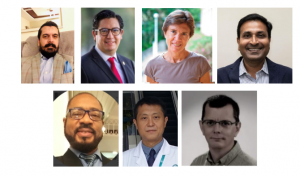
In an effort to expand health and medical education initiatives in countries around the globe, and to expand the horizons of our current membership by actively engaging more countries in our association, the Membership Committee has created the IAMSE Ambassador Program. Each country’s Ambassador will act as a representative to spearhead the formation of a working group in their country in order to promote collaborative scholarly activities, service and training through IAMSE.
In the initial cohort for this new program we would like to welcome Drs. Yawar Hayat, Raul Barroso, Diann Eley, Sateesh Arja, Joseph Granuum, Zhimin Jia, Szabolcs Felszeghy. These new members represent Pakistan, Mexico, Australia, Carribbean, Estonia, China and Finland, respectively.
For Australia and New Zealand, this program is very important. Di Eley, of the University of Queensland (Australia) said, “By virtue of our geographical location, connecting and collaborating across several time zones can be challenging. The Ambassador Program aims to enhance more collaboration with medical science educators across universities and teaching hospitals on a global scale. Partnering (together) will certainly facilitate this goal.” Yawar Hayat Khan of Riphah International University (Pakistan) added, “I think overall the IAMSE Ambassadors Program is a great initiative and will not only help us in grooming ourselves as ambassadors but at the same time enable us to work as a team to represent and promote IAMSE globally.”
“There is no lack of major opportunities within IAMSE, rather these opportunities need to be made more known to our educators and future members here in Nordic countries,” said Finnish Ambassador Szabolcs Felszeghy of the University of Eastern Finland. Ambassador to the Caribbean region, Sateesh Arja, added, “The (Ambassador) Program is intended to disseminate and support all communications and messages from IAMSE to medical educators in (our respective) region. Thereby the work done by IAMSE, either webinars or manuals or conferences, will reach out to the larger population of medical educators, academic leaders, students, and other stakeholders involved in health sciences education.”
We look forward to the inevitable growth of this program and to seeing the amazing things that these Ambassadors will do to promote IAMSE and medical science education in their regions.
Thank you,
IAMSE Ambassador Program
